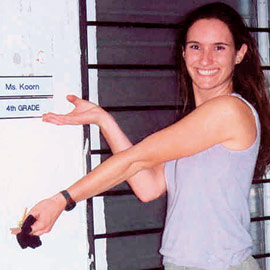Port-au-Prince, Haiti: When God Says “Go”
A few weeks ago a sixth-grade girl at the school where I teach in Port-au-Prince, Haiti, approached me in tears. “What is it?” I asked. “My dad went to work this morning,” she sobbed. We both knew what that meant. The last time her father left home for his job, he returned with gunshot wounds.
  Trisha Koorn’s fourth-grade classroom is secured with bar-covered windows. Trisha Koorn’s fourth-grade classroom is secured with bar-covered windows.
|
 |
Welcome to Port-au-Prince. On any typical day, rebel forces might ambush a police station, rob local businesses, or kidnap people on the streets. Residents here fear for their lives, and my students and I are no exception.
I first came to Haiti in September 2000. After graduating from SPU, I decided to trade in my comfortable life in Seattle for a dangerous
one in Port-au-Prince. One Sunday in August 2000, some missionaries from Haiti had visited my church. Later that day, I received a phone call from the visiting missionary asking me about my interest in teaching overseas. After two days of researching Haiti and praying, I decided to follow God’s lead. One month later, I was on a plane Haiti-bound.
Once there, I began teaching fourth grade at Quisqueya Christian
School, which serves children of missionaries and local business
leaders. I promised to stay a year, but by the time the second year came and went, I knew I couldn’t leave. In a country with so much instability, these students needed teachers willing to commit to them. They needed me, and I wasn’t going to let them down.
Five years later, I’ve never regretted my decision to stay. But it hasn’t always been easy. I’ve been evacuated for a short time, survived
a hurricane, woken at 3:00 a.m. to gunfire outside my bedroom
window, dealt with the fear of prison riots, seen street protests, and observed people lying dead on the side of the street.
Why do I stay? The only answer I have is God. Matthew 28:19 says, “Go and make disciples of all nations.” To put it simply, God called me to go, and God calls you to go. That doesn’t mean you should join me in Haiti, or another country across the globe. But it might mean that God is calling you to engage your town, your work, or your family.
In my time in Haiti, I’ve been fortunate to see God working in the lives of the children of Quisqueya Christian School, many of whom had never had a relationship with Christ. Parents have come to know the Lord through their children, and when they are in trouble, they turn to God for help.
After many of the kidnappings and robberies within our community,
families return to our school to share how God was there through their struggles. After one kidnapping ended, the parents who were kidnapped told us how they had always thought they would leave Haiti if something like this happened. Yet they chose to stay. They described how God had given them strength and how they remembered the prayers and Bible verses their son and daughter had brought home each week from school. During these times, the students turn to their teachers and ask for prayer, a hug — any assurance that God is bigger than any situation they or their family may encounter.
My students and their families have shown me what it really means to live for Christ, in happy times and in hard times. In Haiti, we must confront our fears, because chances are good that they’re not going away anytime soon. As a result, friendships are real here, and people depend on one another.
How long will I stay? The Lord is the only one who knows the answer to that question. Washington will always be my home — the place where I am most comfortable and where my family and friends are — but Haiti has also taken a place in my heart. Sure, it’s uncomfortable sometimes, but it is during these times of discomfort
that I really put my trust in God.
My motto is this: Where he says go, I must follow — whether it’s a few miles from my neighborhood, or to a small dot on the map I may have never even considered. When it comes right down to it, if Jesus were here today, he wouldn’t stand back and watch the world’s suffering. He would be there serving, and that’s right where I want to be. Jiangzi, China: Improving Women's Health
Brikama, The Gambia: Trading Comfort for Commitment
— BY TRISHA KOORN '00
Back to the top
Back to Home |
